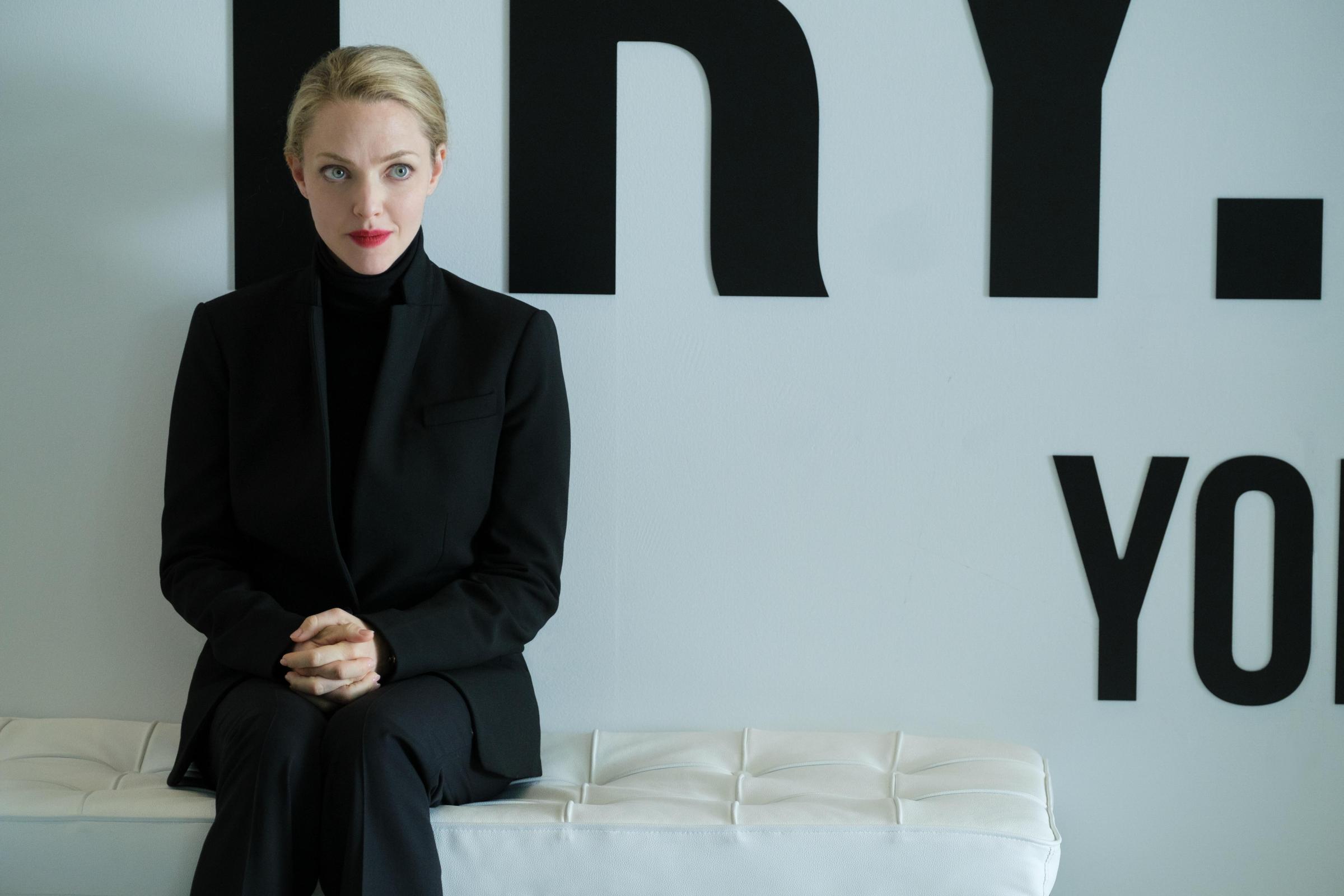If it feels like there have been countless projects in the works about ex-Silicon Valley prodigy Elizabeth Holmes for years, it’s because there have been. As a culture, we love watching the ultra-wealthy crumble at the hands of their own hubris, and Holmes sparked more schadenfreude than any other case in recent memory. Holmes was the lauded CEO of Theranos, a biotech company that claimed to have invented a machine that could run dozens of blood tests using just a drop of blood. At its peak, Theranos was valued at $10 billion and counted Henry Kissinger among its board members. In January 2022, Holmes was found guilty on multiple counts of defrauding investors and wire fraud.
The Hulu original series The Dropout is the first dramatization of the rise and fall of Theranos. The Dropout is based on an ABC podcast series of the same name that started in 2019 and continued through Holme’s trial in 2022. The first season of the Hulu show covers the first season of the podcast, which details how Holmes went from a precocious Stanford student to become the poster child for corruption in Silicon Valley.
Starring Amanda Seyfried as Holmes and Naveen Andrews as her business and romantic partner Sunny Balwani, the show depicts many of the Theranos employees, investors, scientists, and journalists interviewed or described in the podcast. Listeners of the podcast will recognize some of the names, but even if you haven’t listened, the show does a good job of contextualizing the people in each era of Holmes’ life who either enabled her or tried to stop her.
The show sticks so faithfully to the podcast that it sometimes feels like the project is unnecessary. What does a dramatization add that a documentary or piece of journalism hasn’t already covered? That’s always the question when it comes to true stories like this that end up told in a dozen different forms. Like the films and TV shows covering notorious zookeeper Joe Exotic or New York scammer Anna Delvey, it can feel like studios overestimate the hunger from audiences for more content.
But The Dropout does humanize Elizabeth Holmes, in a way. In the cultural imagination, Holmes has become such a caricature of a villain that she has come to seem more like an idea than a real person. While The Dropout doesn’t downgrade Holmes’ crimes or justify her hunger for power, it draws out her vulnerabilities and explains what motivates someone to that level of greed. Villains are people too—that’s what makes them so disarming.

The Dropout depicts many characters from the podcast
Certain characters from the Theranos universe crop up in every story about the Elizabeth Holmes case, and many are portrayed in the series. Both the podcast and the show track Holmes from her early beginnings to her demise and everything in between. Each era of Holmes’ business features new sets of people, as her intense drive and suspicious tactics drove some staffers away, while others were lured by her inflated promises. While some characters are manufactured for the sake of moving the plot forward, most of the main and side characters in The Dropout depict real people who worked with Holmes.
Numerous professors who meet Holmes while she’s in college appear: Phyllis Gardner (Laurie Metcalf), who warns her early on that the idea for Theranos is not feasible, and Channing Robertson (Bill Irwin), who became the first board member of Theranos. Robertson does not comment in the first season of The Dropout podcast, but Gardner is interviewed about when she met Holmes as a 19-year-old student. Gardner, a medical professor at Stanford University, told Holmes that her idea for a microfluidic patch that tested blood and delivered medicine was not possible. Holmes forged ahead anyway.
The show also heavily features the story of Ian Gibbons, a biochemist who began at Theranos in 2005 as the company’s chief scientist. Gibbons wanted to leave, but stayed because as a cancer patient, he needed the insurance. When Gibbons was subpoenaed in a lawsuit against Theranos, he was faced between lying in court to save his job, or telling the truth about Theranos and getting fired. In 2013, the day before Gibbons was supposed to appear in front of lawyers, he died by suicide.
In The Dropout, Gibbons is carefully portrayed by Stephen Fry. He shows the defeated and depressed Gibbons near the end of his life, but most of his performance presents Gibbons as an extremely smart, funny, and warm person beloved by all his colleagues. It lays bare the crux of Holmes’ problem: while she spoke at length about wanting to innovate the healthcare industry and provide better access to care, the scientist who created her patents couldn’t leave his job because he would lose his healthcare.
Then there’s the crew of people who aided in the downfall of Theranos: whistleblowers Erika Cheung (Camryn Mi-Young) and Tyler Shultz (Dylan Minnette), who is also the grandson of Theranos’ most trusted board member George Shultz. As characters in the show, Erika and Tyler, both young post-grad employees, make it clear that Theranos’ fraudulence was so obvious, even these lowly employees could see. Ebon Moss-Bachrach plays journalist John Carreyrou, the Wall Street Journal reporter who first broke the story about Theranos’ fraud. And William H. Macy sports a huge bald cap to play the intense and constantly furious Richard Fuisz, who enters a patent war with Holmes.
The show generally sticks close to the source material of the podcast, down to the number of episodes (the first season of the podcast has six episodes while the show has seven). It has not yet been announced whether there will be more seasons of the show to correspond with the other seasons of the podcast.

Crafting Elizabeth Holmes’ signature look
A big appeal of The Dropout is seeing how Amanda Seyfried portrays Holmes, specifically when it comes to what became Homes’ signature look: wild eyes, frizzy hair, bright red lipstick, and a baritone voice. While Seyfried’s impression is not exactly subtle, it is convincing. The actor is adept at portraying the many weird sides of Holmes: she runs and dances like a marionette, she wears hideous Christmas sweaters, she has little life outside of school, until she starts her company, and then she has little life outside work. She rehearses how to have small talk in front of a mirror. Her friends are a bunch of old billionaires. She drinks green juice constantly.
The idea of the Silicon Valley CEO who is a futuristic weirdo disconnected from reality is basically a meme at this point. And it feels true with Holmes, who literally styled her wardrobe after Steve Jobs. But The Dropout tracks how Holmes got to that point. Unlike The Social Network, which remains the definitive work on greed in Silicon Valley but never offered details about Mark Zuckerberg’s personal life or an explanation for why he is the way he is, The Dropout lays the groundwork so Holmes’ actions make sense. When Seyfried as Holmes leaves an important investor meeting to rush to see her dad in the hospital, he croaks from his hospital bed “Why are you here? You have work to do.” And you begin to see how she turned out the way she did.
Read More: In a Season of Subpar Scammer Shows, Only The Dropout Is the Real Thing

What the show leaves out and what it elaborates
In any docudrama like The Dropout, there are going to be parts of the true story that don’t make it into the dramatized version, and there are going to be plot points that are made up for the sake of entertainment. After all, there is no way to really know what was said in private conversations behind closed (bullet-proof) doors at the Theranos office.
Aside from Seyfried, the show’s second lead is Andrews as Balwani, who served as the president and COO of Theranos starting in 2009. Balwani made a fortune working in software, but had no scientific background, which made his presence at Theranos confusing to its employees. Both in the show and in real life, no one working at Theranos, nor its investors, knew that Holmes and Balwani were in a long term romantic relationship until the downfall of the company.
Balwani and Holmes met Balwani when she was 18 and he was 37 and they were both studying abroad in Beijing. In The Dropout, their initial meeting is portrayed as sweet—Holmes is awkward and takes the program much more seriously than her peers, and Balwani appreciates her seriousness. Nothing romantic happens between them until Holmes has already secured the first Theranos office. For the first few episodes of the show, much of their relationship is surprisingly wholesome, with Balwani acting as a protector for Holmes, who’s already in over her head. In one scene, he uses his status to help her father secure a better hospital room. In another, he makes sure she eats dinner. This feels like it has more to do with the performances (and good looks) of both Seyfried and Andrews than it does with the reality. But then again, we don’t really know. We do know about some of their awkward text messages, which were revealed in court.
During her trial, Holmes also testified that Balwani emotionally and sexually abused her during their relationship. This puts The Dropout in something of an awkward place, because while it’s important to believe women about their abuse, Holmes has revealed herself to be a serial liar. Balwani, however, was known to have a temper around the office, which The Dropout makes clear, and they also show him losing his temper toward Holmes. While it doesn’t depict their relationship as necessarily abusive, it does make it clear that their relationship was not a healthy one. (The show does depict the true story that Holmes was raped at a frat house at Stanford University, and that the school didn’t lodge any punishment at the perpetrator. In real life, Holmes filed a police report about her assault in 2003 when she was 19).
The show leaves out some of the information covered by the podcast related to the downfall of Theranos. As reported by the podcast, whistleblower Tyler Shultz first reported Theranos to the New York State Department of health using an alias, before speaking on record with the WSJ. This does not appear in the show, which is minor, but it does cloud the fact that many people were going down many avenues in trying to bring down Theranos.
The show also leaves out Stanford professor John Ioannidis, one of the first experts to openly question Theranos. Ioannidis wrote a column in the Journal of the American Medical Association in 2015 criticizing Theranos for its like of peer reviewed work and the secrecy around how it’s technology actually works.
Whether The Dropout provides new insights on Holmes depends on how much you already know about her case going in; it could be completely enthralling, or it could be redundant. But it does offer some charismatic performances and an examination of the weird and wild world of Silicon Valley.
More Must-Reads from TIME
- Donald Trump Is TIME's 2024 Person of the Year
- Why We Chose Trump as Person of the Year
- Is Intermittent Fasting Good or Bad for You?
- The 100 Must-Read Books of 2024
- The 20 Best Christmas TV Episodes
- Column: If Optimism Feels Ridiculous Now, Try Hope
- The Future of Climate Action Is Trade Policy
- Merle Bombardieri Is Helping People Make the Baby Decision
Contact us at letters@time.com